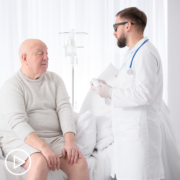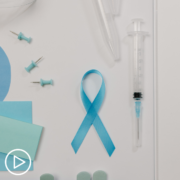Establishing Treatment Goals: What Are Options for Advanced Prostate Cancer Therapy?
Establishing Treatment Goals: What Are Options for Advanced Prostate Cancer Therapy? from Patient Empowerment Network on Vimeo.
Prostate cancer treatment goals can vary by patient – thus why it’s essential to have different treatment options. Expert Dr. Xin Gao explains the importance of establishing treatment goals and shares an overview of available options.
Dr. Xin Gao is a Medical Oncologist at Massachusetts General Hospital. Learn more about this expert Dr. Gao.
See More From INSIST! Prostate Cancer
Related Resources

What Key Factors Impact Prostate Cancer Treatment Decisions? |

How Does Prostate Cancer Progress? Understanding the Stages of Prostate Cancer |

|
Transcript:
Katherine:
Dr. Gao, now that we know what goes into understanding a patient’s disease, I’d like to talk about treatment, starting with treatment goals. How do goals vary by patient, if they vary at all?
Dr. Gao:
Sure, yeah. I do think they vary, and I think it is important to be clear about what the realistic goals of treatment might be so that the patient can make an informed decision on how the prostate cancer should be treated or managed.
Some prostate cancers are highly curable, although there isn’t anything that’s 100 percent, right? And others are curable, but we acknowledge that there may still be a significant risk of relapse despite treatment. And maybe that rough percentage, the probability of cure and sort of the potential downsides or side effects of treatment, that’s something that the patient has to weigh in terms of whether they want to proceed with that treatment or not.
And then, there are cancers, especially with advanced prostate cancers, that are unfortunately not curable, but yet treatments have the ability to significantly prolong somebody’s life, to slow the cancer progression down or even to shrink it, and to improve cancer-associated symptoms and other sources of distress that we talked about earlier.
And so, with each patient, I think it is important to talk about these treatment goals because it may not be readily clear, is this a curable cancer or not? And it might not be clear how much benefit they might expect with treatment or are we talking about a marginal benefit? And then that way, you know, they can think about it, talk about it with their family, and kind of factor into their overall benefit risk calculation about whether to do something or not.
Katherine:
Would you provide an overview of current treatment options for advanced disease?
Dr. Gao:
Sure. So, it’s a big, very open-ended question, I think.
So, I think you can divide it up into sort of the major treatment modalities, so things like radiation or radiation types of therapies, chemotherapy, hormonal therapies which are the mainstay of prostate cancer treatments, targeted therapies, and immunotherapies.
Starting with hormonal therapies which are the backbone of prostate cancer treatments, for advanced prostate cancer, androgen deprivation therapy or ADT is often given indefinitely as the typical standard of care treatment and there are various forms of ADT, most commonly in the form of long-lasting injectable medications – leuprolide (Eligard/Lupron Depot), goserelin (Zoladex), sometimes degarelix (Firmagaon) is used. And then more recently, there was an FDA approval a couple years ago of an oral pill called relugolix (Orgovyx), which is also a form of ADT or androgen deprivation therapy.
These medications block the body’s ability to make testosterone which is important for prostate cancer survival and spread. In addition, abiraterone is an oral medication that is also considered a hormonal therapy. It blocks the production on androgens or male sex hormones outside of the testes. That includes the adrenal glands and some other tissues such as prostate cancer itself. And abiraterone (Zytiga) is commonly used in advanced prostate cancer management, in addition to androgen deprivation therapy whereas ADT blocks the testes from making testosterone and androgens, abiraterone blocks the production of androgens outside of the testes.
And then finally, oral anti-androgen medications that block the prostate cancers from being able to detect androgens or male hormones and to block the androgen receptors on prostate cancers from sending cellular signals for growth and survival are also very commonly used.
There are older anti-androgen medications like bicalutamide (Casodex), flutamide (Eulexin), lutamide, and there are newer ones, stronger versions, called enzalutamide (Xtandi), apalutamide (Erleada), and darolutamide (Nubeqa). For most patients who present with advanced prostate cancer, I think this is much easier, ADT along with either abiraterone or one of the newer, stronger anti-androgens, is the standard of care for most advanced prostate cancer patients with metastatic disease.
And then, sometimes for patients with higher volume or more aggressive cancers even in the group with metastatic disease, we even add on another treatment, usually chemotherapy, something called docetaxel for what we call triple therapy. And then, maybe that’s a segue to chemotherapy, so docetaxel chemotherapy is a common chemotherapy used for prostate cancer, certainly advanced prostate cancers. Cabazitaxel (Jevtana) is also a common chemotherapy in this situation. These two are related drugs in a family of drugs called taxane chemotherapies and basically they kind of block the trafficking of important components within cancer cells and cause the cancer cell death.
Docetaxel (Taxotere) is the more commonly used one. It’s typically used earlier, before cabazitaxel. And like I said earlier, for certain patients with what we call high volume metastatic prostate cancer, it’s often used in combination with hormonal therapies early on, what we call upfront therapy for six cycles. If a patient doesn’t receive docetaxel up front, docetaxel is commonly used after progression, after the cancer has progressed on ADT and one of the oral hormone medications.
Cabazitaxel is more commonly used after a patient has previously received or progressed on docetaxel. Both drugs have been evaluated in randomized Phase III clinical trials and have shown to provide efficacy for patients with advanced prostate cancers.
In addition to these taxane chemotherapies, platinum chemotherapy, such as carboplatin or cisplatin, are sometimes used for advanced prostate cancers as well, especially for certain neuroendocrine or small cell prostate cancers. These are rarer cancers, but they tend to respond better to platinum-based chemotherapies.
Or for certain what we call aggressive variant prostate cancers, these platinum-based chemotherapies are also used in combination with either one of the taxanes or with another chemotherapy drug called etoposide. In terms of other treatment modalities, I think recently what we call radiotherapeutics or radioligand therapies have gotten a lot of press with the approval of a new medication called lutetium PSMA or 177 lutetium PSMA 617 (Pluvicto).
The brand name for that in the U.S. is Pluvicto and what this is is a drug that’s a small molecule that binds to PSMA, which is a protein highly expressed in close to 90% of prostate cancer, advanced prostate cancers. And the small molecule will home to the cancer and it’s linked to radioactive lutetium and the lutetium will decay in that area and lead to cancer cell death.
So, Pluvicto or lutetium was FDA approved in spring of 2022 based on randomized Phase III trials that show significant efficacy for patients with metastatic castration-resistant prostate cancer who have previously received a second-generation androgen receptor pathway inhibitor, such as abiraterone and enzalutamide, as well as a taxane chemotherapy, like docetaxel or cabazitaxel.
The medication is given intravenously, once every six weeks, for up to six doses, and there are ongoing clinical trials, actually, that are trying to evaluate this medication in earlier settings where patients haven’t gotten prior chemotherapy before. There was a press release from about half a year ago stating that they’re seeing some early encouraging signs of efficacy with this drug, even in patients who had never received chemotherapy before, so it may be a medication that is going to be used more and more so in more patients even earlier in their course of disease. they’ve shown pretty solid activity for those kinds of cancers.





